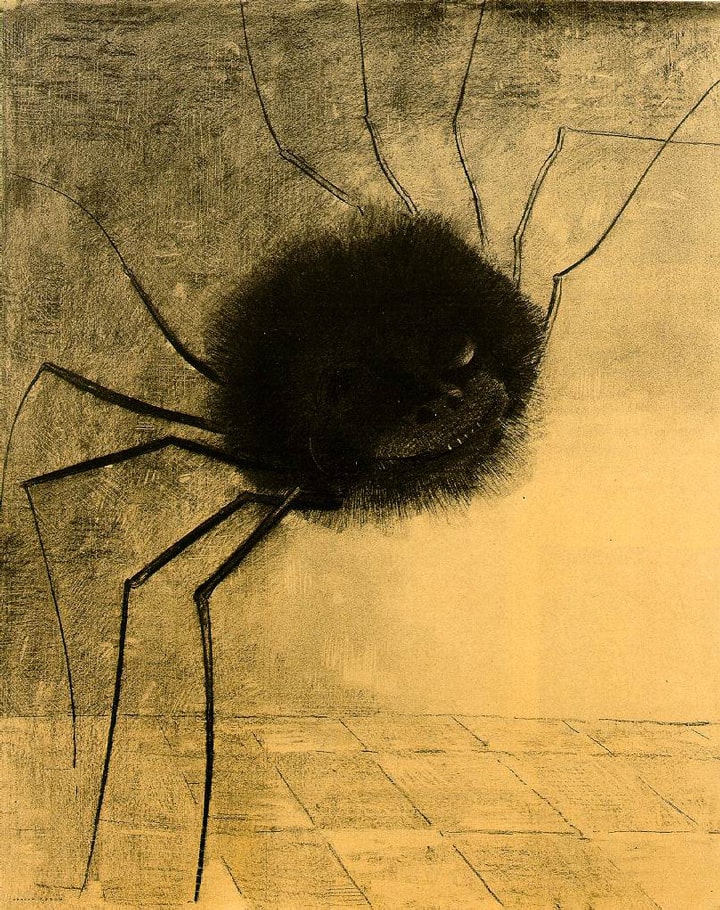



























A community of peasants makes a pact with the devil, and unseen forces begin to unfold.

»Then the man fled as far as his legs could carry him; but when he stopped, breathless, the spider was already before him [...]«
A baptism is about to take place in a small community and the celebration moves to a newly built house. During the meal, a block draws attention. Its worn surface suggests it is far older than the house itself. The grandfather, noticing the curiosity, begins to speak. He tells a story on how the community was once haunted by a dark force.

Jeremias Gotthelf was the pen name of Albert Bitzius, a Swiss pastor and writer, born on October 4 1797 in Murten, in the canton of Fribourg and raised in Lützelflüh in the Emmental. After studying theology in Bern he was ordained as a Protestant pastor in 1820. From 1832 until his death in 1854, he served as the parish priest in Lützelflüh, where he also created his literary works.
His inspiration came from rural life in the Emmental, which he knew through his pastoral work. He observed the struggles of peasants facing poverty, social change or moral dilemmas and transformed these experiences into prose.
Although he was never a cosmopolitan author, Gotthelf’s works found readership in Switzerland and Germany. The Black Spider remains his most famous work, admired for its gothic intensity and praised by Thomas Mann as one of the great achievements of world literature.
The pen name Jeremias Gotthelf sets the tone and reveals the mission: Jeremias as in The Lord is exalted while Gotthelf means God’s helper. From the outset, we are dealing with literature as moral allegory with a religious core. I came to The Black Spider after reading The Jew’s Beech and the connection felt natural. Both texts belong to that dark, gothic current in 19th century German literature: part Biedermeier, part folklore. In hindsight, The Black Spider reads almost like a textbook example of that tradition. Although it's swiss!
What surprised me most was the rawness of the narration. For a priest, Gotthelf does not shy away from grotesque detail: the body horror, temptations that verge on the physical, even the suggestion of offering one’s body to the devil. It is anything but a sanitized fable. Gotthelf writes in German, but his text is peppered with Swiss dialect words. You constantly stumble across terms that feel unfamiliar. A glossary or annotated edition is helpful, but also reading it in English can be.

The novella plays with suspense: In the first half, the word spider is never even mentioned. Only later does the monster dominate the narrative, appearing in nearly every other sentence. The characters are drawn as types: the greedy knight, the cowardly villagers, the virtuous outsiders Christen and Christine who sacrifices themself in different times. These characters are not individuals; they are embodiments of moral and social positions. And their names practically hit you over the head with it.

Gotthelf was a patriot and anti-Jewish. In this novella this tendency is muted, perhaps only surfacing in the devil’s hooked nose, which echoes a familiar stereotype. Where stereotypes appear more clearly is in the narrator’s satirical observations about village life:
“With womenfolk there’s nothing to be done anymore. […] Their heads are full of nonsense and vanity; they dress like peacocks, strut about like storks, and if one of them has to work half a day, she suffers three days of headaches and lies four more in bed before she recovers.”
And the young men are no better:
“Smoking tobacco, sitting in taverns, tipping their white hats to the side and staring wide-eyed like city gates, after every skittle game and every loose girl they go chasing. […] But when it comes to milking a cow or plowing a field, they’re useless, as clumsy as a gentleman.”
Passages like these offer a glimpse into rural 19th-century attitudes. They remind us how familiar such grumbling sounds: the vanity of women, the laziness of youth, the corruption of modern habits, themes repeated across generations.

The imagery anticipates later horror tropes: the monstrous spider is almost alien.
At its core, The Black Spider dramatizes the consequences of abandoning faith. Once the villagers turn away from God, destruction is inevitable. Yet it is also striking that the peasants are hardly given a choice at all – the knight’s greed forces their hand. What also stands out is that the villagers never approach God directly, but always only through the priest. This priest meanwhile, is cast as the hero: moving under God’s hand and light, he steps forward, rescues the child and sprinkles it with holy water to save the day.
The Black Spider is a nice short read. Its handled topics makes it both a product of its time and therefore timeless.